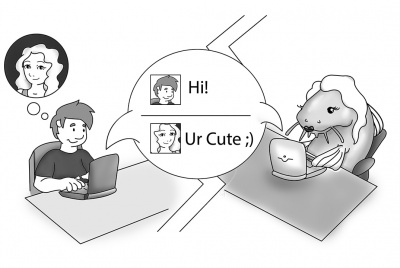Online Dating - Catfishing Edition

Catfishing refers to an action performed by someone that uses another person’s online identity as their own. These actions target other individuals, often causing harm and always feeding on deception. Some of the reasons one may be inclined to use a false online identity include, but are not limited to, low self-esteem, depression or anxiety, revenge, monetary gain, exploring sexuality, and seeking out harassment.[2]
Contents
Background
Although the concept of catfishing has long been a part of society, the term itself wasn't coined until 2010, when Nev Schulman released the film Catfish about his own experience being catfished. Schulman's experienced revolved around his relationship with a woman he met online and how he discovered that she was not in fact the person she identified herself as. Following its release, many people who had similar stories to Schulman seemed to identify with the film which inspired Schulman to create Catfish the television show to share those stories.
Demographics
Catfishing can impact certain communities more than others, whether this be in relation to race, gender, or sexual orientation. Additionally, some specific communities have relatively higher rates of catfishing than others.[3]
As of 2021, Alaska has been identified as the state with the highest number of catfishing reports.[4] In addition, Alaska, Nevada, and Wisconsin (the most dangerous scamming state[5]) are also recognized catfishing hotspots. On the contrary, states with relatively few instances of catfishing include Vermont, South Dakota, and Montana. When people report cases of catfishing where scams are involved, individual states calculate the amount lost and keep a running total of those values over the course of each year.
Branded, a data collection website, conducted their own research with their community members to determine how many of them had engaged in the act of catfishing. Their results showed that from a sample of size 16,827, about 1 in 5 people have impersonated someone else online to gain favor with others. [6] From those same results, 25% of the men who participated in the poll admitted to catfishing versus 18% of the women. Branded's results also reveal that, in relation to race and ethnicity, 28% of people who identify as Asian, 23% of people who identify as Hispanic, and 20% of people who identify as African American use a social media identity that is not their own. [7]

In The Media
Catfish: The TV Show
The TV show Catfish stemmed from Nev Schulman's movie about his experience and relationship with a woman, "Angela," who falsified her online identity and in fact, turned out to be a married woman. Schulman is credited with coining the word "catfish," invented following a conversation with "Angela" and her husband. In that conversation, "Angela's" husband mentioned that codfish, when transported from Alaska to China, would often arrive tasteless, so he used catfish instead to ensure that the fish would remain nimble and arrive ready to eat. The catfish "keep you guessing, they keep you thinking, they keep you fresh. And I thank god for the catfish because we would be droll, boring and dull if we didn’t have somebody nipping at our fin." [9]
The Show
Using his own movie as inspiration, Schulman created Catfish: The TV Show to share the stories of people who experienced similar situations to his own. Schulman was joined by Max Joseph, and the two went on to co-host seven seasons of Catfish together, traveling across the nation to discover whether someone’s lover was who they claimed to be or an impersonator. The show is currently on its eighth season with Schulman and Kamie Crawford as co-hosts. [10]
On the show, Schulman and his team help individuals who suspect that they are being catfished but lack certainty in their suspicions. Using his resources, Shulman researches the supposed catfisher and works with the show's guest to discover this person's true identity.
Behind the Scenes
Furthermore, while the show is being filmed, the producers know what is going on and who is the person behind the screen before the hosts Nev Schulman and Max Joseph find out. The producers keep it as a secret, and they let Nev and Max do the digging to find if the person they are searching for is a catfish or not[11]. An episode of the show usually takes longer than expected to film than the time frame presented in the show.
The popularity and reputation Catfish has created tension for people to be on the show by catfishing others themselves. However, according to the producers, those methods are easy to spot when the facts do not align with each other[12]. The show consists of actual people who believe they are being catfished, and thus an episode is produced. The interest and concern that people in the show demonstrate is also noted by the producers and the hosts. So MTV provides therapists to the people who are on Catfish to ensure that the participants' mental health is account for in a proper way after their experiences[13].
Catfish has admitted to creating creative storylines that are made from the point of view of the catfish. It is assumed that the catfish of the show was the initial person to contact the show, and thus resulting in a probable alteration of the stories to best suit the person the hosts and producers found was more sympathetic[14].

To Catch a Predator
In 2004, NBC launched a new show called To Catch a Predator hosted by Chris Hansen. To Catch a Predator was an American reality tv program that focused on catfishing predators into thinking that they were talking to underage teenage girls online. When a predator and an assumed minor planned to meet up, a sting operation was conducted and the predator was ultimately arrested. [16] The show teamed up with the Perverted Justice Foundation - an organization fighting to combat pedophilia via online chat rooms. Adult members of the Perverted Justice Foundation often join chat rooms while acting as minors and work with law enforcement to find pedophiles. [17]
Catfishing on Dating/Networking Platforms
With the rise of online dating and social networking platforms such as Tinder, Hinge, Bumble, and Grindr, catfishers are in an optimal position to form relationships with others while using fake identities. The nature of these online platforms allows for virtually anybody to make a free account and to assume an identity other than their own with the intent of making themselves look more appealing to other users. Often, the safeguards in the account creation process are insufficient for these applications to ensure that someone isn't engaging in catfishing and/or using someone else’s photos or other personal information. The account creation process for these platforms is often as simple as entering an email address, name, age, and phone number, and from that point onwards, the user is given the benefit of the doubt in that they are their true selves. [18]
In the realm of online dating, catfishing “involves falsely representing oneself to a potential romantic partner, without the intention of meeting in person.” [19] From a study conducted at Georgia Tech University, one interviewee described his own experience being a target of catfishing on an online dating platform: “It was probably like a fake account or what they call a catfish [...] somebody posing to be someone else. [...] She was [a] really pretty girl and we had like a lot in common... [but] it was basically a joking profile, she was just fucking with people and wasting people's time...” [20] As catfishing becomes “more prevalent,” some online dating platforms have implemented software to combat this “relatively new phenomenon.” [19]

One attempt at safeguarding against catfishing and spam is Tinder’s Photo Verification feature, which was introduced in early 2020. This is an opt-in feature, and the way it works is that Tinder will prompt users to take a series of selfies for which they will need to assume certain poses. The selfies will then undergo a manual and automated review. If a user passes this review, they will receive a blue checkmark on their profile for other users to see. [22] Bumble, another forum for online dating, has a similar offering on its platform. [23] [24] While there are no concrete sources focusing on this feature and the reduction of catfishing, the photo verification feature allows for reasonable affirmation that someone on Tinder is who they claim to be.
Self-Presentation and Online Dating

In an online dating context, the definition of catfishing includes people who alter their own identities and whose profiles inaccurately portray who they really are. [19]
Online dating allows users “to construct a carefully crafted persona to expose to potential partners.” [20] The idea of “‘presenting your best self’ has been seen as an important aspect of online dating” because it can help users receive more matches and responses than they might get otherwise. [20] One way people present their best self in their online dating profiles is by “‘fudging’ quantifiable metrics like height and weight.” [20] Professors Catalina Toma, Jeffrey Hancock, and Nicole Ellison conducted a study on this very topic and revealed that “men lied more about their height, and women lied more about their weight.” [26] Additionally, users with online dating profiles may pose in certain manners, edit their photos, or use outdated photos so as to maximize their physical attractiveness to others. [27] In fact, on online dating platforms, roughly “a third of photographs are rated as being ‘inaccurate’ in their depiction of the member.” [20] Users may also exaggerate some parts of their identity on their online profiles by embellishing or twisting facts to make themselves appear more interesting and unique than their true selves. [27]
Famous Catfishing Cases
Christ Andersen
Chris Andersen was a 33-year old basketball star for the Denver Nuggets. He had been a long-time drug user and fought back after a 2-year suspension from the NBA. In 2011, Paris Dunn, a model who was 17 at the time appeared to get a Facebook message from Andersen. They began an online relationship and swapped pictures of each other. Another person started messaging on Facebook named Tom Taylor who claimed to be Andersen's best friends. The catfish orchestrated a meeting between the two and they had quickly realized that there were many inconsistencies with their conversations. After capturing and confiscating Andersen's belongings, they had found that a reclusive woman named Shelly Chartier had been catfishing both Andersen and Dunn and allegedly been tormenting 11 victims over the course of 3 years. [28]
Sabrina Nichole
Sabrina Nichole is one of the most famous faces used for catfishing in the world. She had reported that she has received countless messages on her personal Instagram account of people "asking for their money back." Nichole reported having to spend hours reporting fake accounts of herself because of her own internal guilt of unintentionally catfishing other people. [29]. According to her, the catfishing began with a large Facebook page impersonating as her and scamming fans, which continued scaling.
Manti Te’o
Manti Te’o, a decorated and well known Haiwaiian football linebacker, was also a notable victim of a catfishing incident. In 2012, Te’o announced that both his girlfriend and grandmother had passed away on September 11th, drawing the sympathy of many. [30] His nomination as a Heisman Trophy candidate and in-game success along with his tragic backstory drew attention to his girlfriend, alleged Stanford University student, Lennay Kekua. A later article revealed the hoax identity of Kekua and claimed the perpetrator was actually Ronaiah Tuiasosopo, an acquaintance of Te’o’s.[31] Te’o continued to deny accusations of his involvement due to previous lies about meeting in-person until a later interview in which he professes his innocence. [32]
Lincoln Lewis
Lincoln Lewis is an Australian actor whose identity was used as part of a catfishing scheme. Lydia Abdelmalek was identified as the perpetrator after one of her victims took her life after being encouraged to by another one of Abdelmalek’s aliases.[33] Abdelmalek also sent abusive and threatening messages under the guise of anonymity, after using her fake identity as Lewis to establish a connection. Lewis himself recounted several incidents of women messaging him, claiming to have been in a relationship and he reported that his number, address, personal details had all been illegally obtained at some point.
A Rape on Campus
A Rape on Campus is a magazine article that was published then retracted by the Rolling Stones based upon an alleged sexual assault case that occured at the University of Virginia. The article recounts Jackie’s retelling of her gang rape at a fraternity house as part of a fraternity initiation ritual. After the article went viral, UVA suspended all fraternities and the case drew national attention from the media. However, after some investigation was done into the claims, it was found that Jackie had fabricated portions of the story in the hopes of wooing a romantic interest on campus.[34] Jackie had created a fake identity named Haven Montana, who she claimed directly participated in her alleged attack. Haven Montana was also used to catfish the victim, being privy to private conversations and positively portraying Jackie.[35]
Types of Catfishers
Within the realm of catfishing, there are various types of catfishes. Each one has different motives and agendas when they’re meeting an individual online.
Cyberbullies
Cyberbullying is often widespread amongst teenagers and even adults. Cyberbullies will create fake profiles online to share and spread information about a person they may or may not know. Their aim is to hurt, intimidate or harass the individual they’re targeting. [36]. Bullying has always been prevalent within society, but the introduction of technology has heightened this prevalence and allowed bullying to occur on a larger scale. Depending on the offense, cyberbullies may face legal ramifications. [37]
Revenge
Those who feel jealousy or anger towards another individual may use catfishing as means to “get back” at or “get revenge” on those who have wronged them. These catfishers will often create fake accounts and post pictures of their target without consent. This is typically intended to harm the target's reputation or to embarrass them. These catfishers can also use the accounts they create to lure and seduce their target, which can result in emotional damage for the target. [38]
Insecurities
Some individuals may lack confidence in themselves when it comes to real life, and so they use the internet to gain the attention and recognition they may not receive otherwise. These catfishers may embody someone they wish to be instead of who they really are, all in the hopes of gaining the connections and respect they could potentially miss out on if they stuck to their true identities. In turn, this form of catfishing can help users' self-esteem and give them a glimpse into a life they may desire but lack the ability to create with their own reality. [39]
How to Spot a Catfish
Many scammers reuse / use the same fake photos. Additionally, sometimes it is possible to perform a "reverse image" search where you can upload an image to Google and check to see if it is unique / authentic. It is also common for catfishers to use the same 'canned phrases' over and over. It is also common for scammers to be involved with many victims at the same time and spend many hours talking to them a day.
Motivation, Personality Traits of Catfishers
Out of 27 people, 41% of the respondents listed 'loneliness' as their reason for catfishing. Another respondent said that he "wanted to be more popular and make friends that could talk to me during the day." Others claimed that a lonely childhood and struggles with social connection were large, contributing factors. A lot of the respondents also reported having dissatisfaction with their own personal appearance. Some of them admitted having self-esteem problems, considering themselves unattractive/ugly and the only way to fix this would be with a false identity. However, among all of the responses, the most common one was that more than 2/3 of wanted to escape their insecurities and live a life that was not their own. [40]
Legislation
Even though catfishing is a serious problem, many social media sites have very few rules and regulations in place to stop people from doing so.[41] In 1966, Congress passed the Communications Decency Act with the initial goal of shielding minors from pornography.[42] They eventually added an amendment, Section 230, that states, “no provider or user of an interactive computer service shall be treated as the publisher or speaker of any information provided by another information content provider.”[43] In other words, this means that online intermediaries that host or republish speech (in the case of catfishing, this could include images) are protected from different laws that might hold them accountable for what others say or do, therefore perpetuating and permitting catfishing.[43]
State legislatures and courts often debate as to whether or not they can hold people accountable for impersonating someone else. In 2016, Oklahoma became the first state to explicitly demonstrate ramifications for catfishing by introducing the Catfishing Liability Act.[44] This act, “imposes a liability on any person who knowingly uses another’s name, voice, signature, photograph, or likeness through social media to create a false identity without such person’s consent… for the purpose[s] of harming, intimidating, threatening or defrauding.”[44] When an event of catfishing takes place, there are always at least two victims involved: the person who is fooled into thinking they are forming a connection with another person and the person who’s photographs the catfisher used. The Catfishing Liability Act allows the impersonated victim to request an automatic injunction against the person who stole their digital property in addition to monetary damages including a minimum $500 award.[44] However, this Act doesn’t do anything for the actual victim of the catfishing attack. This is because online impersonation laws are created with the intent of protecting a person’s name and reputation.[44]
Ethical Concerns
With the wide variety of social media applications that currently exist, people have a plethora of opportunities to interact with others however they choose. This brings about the possibility for one to interact with someone on one of these applications whose online presence is not their true self. In certain capacities, impersonating a professional can be illegal. [45]
As catfishers take to online spaces looking for partners or friends, their actions often exploit other people’s anxieties, self-confidence (or lack thereof), and optimism. [46] In early to mid-2020, as travel and gathering restrictions were enacted due to the ongoing COVID-19 pandemic, attention was once again brought to the topic of catfishing [47]. Due to social distancing and the largely remote nature of most interactions during the pandemic, the prospect of eventually having to meet up with someone they were communicating with online was not as much of a factor in deterring potential catfishers. [47] That, along with the added stressors that quarantine, isolation, and fear of catching the virus bought on, people could be more susceptible to being a target of catfishing [47]. According to a poll from the American Psychiatric Association released in October 2020, 62% of Americans reported feeling anxious, roughly a 30% uptick from the same poll conducted at the same time the year prior. [48].
Catfishing can occur outside of mobile dating applications as well. It can occur through the act of altering one's digital image through software editing apps like Facetune and Photoshop. These additional tools can completely change the way someone or something looks without much knowledge about it on the other end unless specified. More ordinary people and celebrities have come to admit they use those tools to alter the way their pictures look for magazines or their personal social media accounts[49].
As a result of catfishing, people's mental health is affected in a variety of ways that is unique to them and their experience. The deceptive presentation of oneself, intentional or unintentional, also gears a human response from the person that is experiencing traumatic events like so[50]- ↑ Craddock,B.(2013, February 08)."Something's Fishy: Safety concerns come hand-in-hand with online dating".The Flare Online.https://theflareonline.com/2013/02/somethings-fishy-safety-concerns-come-hand-in-hand-with-online-dating/
- ↑ Brennan MD,D.(2020, December 03)."Signs of Catfishing". WebMD.https://www.webmd.com/sex-relationships/signs-catfishing
- ↑ (2017, January 10)."Abuse Using Technology". Women's Law.https://www.womenslaw.org/about-abuse/forms-abuse/technology-abuse/technology-tool-abuse/impersonation
- ↑ Grant,A."States with the Highest Catfishing Rates". https://bestvpn.org/catfishing-statistics/
- ↑ Nyman,S.(2019, June 06)."Suckers for love? Report shows Wisconsin among top states for romance scams".Post Crescent.https://www.postcrescent.com/story/life/2019/06/06/catfishing-statistics-wisconsin-ranks-no-3-romance-scams/1365159001/
- ↑ Miles,K.(2019, May 15)."Men Are More Likely Than Women To Catfish".Branded.https://gobranded.com/men-likely-women-catfish
- ↑ Miles,K.(2019, May 15)."Men Are More Likely Than Women To Catfish".Branded.https://gobranded.com/men-likely-women-catfish
- ↑ Buckman,C.(2018, January 22)."'Catfish: The TV Show' makes casting stop at SDSU".The Daily Aztec.https://thedailyaztec.com/87229/artsandculture/catfish-the-tv-show-makes-casting-stop-at-sdsu/#
- ↑ Harris,A.(2013, January 18)."Who Coined the Term “Catfish”?".Slate.https://slate.com/culture/2013/01/catfish-meaning-and-definition-term-for-online-hoaxes-has-a-surprisingly-long-history.html
- ↑ "(2012)."Catfish: The TV Show".MTV. https://www.mtv.com/shows/catfish-the-tv-show/3wergr/season-6
- ↑ Are We Being Catfished by 'Catfish'? An Investigation. Are We Being Catfished by 'Catfish'? An Investigation. https://www.cosmopolitan.com/entertainment/tv/a30422952/is-catfish-show-scripted/
- ↑ Are We Being Catfished by 'Catfish'? An Investigation. Are We Being Catfished by 'Catfish'? An Investigation. https://www.cosmopolitan.com/entertainment/tv/a30422952/is-catfish-show-scripted/
- ↑ Are We Being Catfished by 'Catfish'? An Investigation. Are We Being Catfished by 'Catfish'? An Investigation. https://www.cosmopolitan.com/entertainment/tv/a30422952/is-catfish-show-scripted/
- ↑ 15 Behind-The-Scenes Secrets From Catfish You Had No Idea About. 15 Behind-The-Scenes Secrets From Catfish You Had No Idea About. https://screenrant.com/catfish-behind-the-scenes-dark-facts-trivia-secrets/
- ↑ To Catch a Predator. Crime Museum. (2017, June 27). https://www.crimemuseum.org/crime-library/crime-in-the-media/to-catch-a-predator/.
- ↑ Hansen, Chris. (2006, September 13). They’re Still Showing Up. ‘’NBC News’’ https://www.nbcnews.com/id/wbna14824427
- ↑ Perverted Justice Foundation. Frequently Asked Questions. http://www.perverted-justice.com/index.php?pg=faq#cat1
- ↑ Tinder: A Guide To Tinder: Signing Up and Getting Started: How do I create a Tinder account? https://www.help.tinder.com/hc/en-us/articles/115003356706-How-do-I-create-a-Tinder-account-
- ↑ 19.0 19.1 19.2 Mosley, M. A., Lancaster, M., Parker, M. L., & Campbell, K. (2020). Adult attachment and online dating deception: a theory modernized. Sexual and Relationship Therapy, 35(2), 227–243. https://doi.org/10.1080/14681994.2020.1714577
- ↑ 20.0 20.1 20.2 20.3 20.4 Masden, C., & Edwards, W. K. (2015). Understanding the Role of Community in Online Dating. Proceedings of the 33rd Annual ACM Conference on Human Factors in Computing Systems. https://doi.org/10.1145/2702123.2702417
- ↑ Tinder Photo Verification https://www.help.tinder.com/hc/article_attachments/360041006931/DFunyL2B.png
- ↑ Tinder: What is Photo Verification? https://www.help.tinder.com/hc/en-us/articles/360034941812-What-is-Photo-Verification-
- ↑ Carman, A. (2020, Jan 23) The Verge: Tinder will give you a verified blue checkmark if you pass its catfishing test. https://www.theverge.com/2020/1/23/21077423/tinder-photo-verification-blue-checkmark-safety-center-launch-noonlight
- ↑ Bumble Photo Verification - KISS CATFISH GOODBYE https://bumble.com/the-buzz/the-end-of-catfishing-introducing-photo-verification
- ↑ Profile pic vs real pic: Funny dating memes, Dating memes, Single dating humor. Pinterest. (n.d.). https://www.pinterest.com/pin/44402746310224999/.
- ↑ Toma, C. L., Hancock, J. T., & Ellison, N. B. (2008). Separating Fact From Fiction: An Examination of Deceptive Self-Presentation in Online Dating Profiles. Personality and Social Psychology Bulletin, 34(8), 1023–1036. https://doi.org/10.1177/0146167208318067
- ↑ 27.0 27.1 Ellison, N., Heino, R., & Gibbs, J. (2006). Managing Impressions Online: Self-Presentation Processes in the Online Dating Environment. Journal of Computer-Mediated Communication, 11(2), 415–441. https://doi.org/10.1111/j.1083-6101.2006.00020.x
- ↑ "How NBA star, aspiring model became victims of a massive catfishing scheme out of Canada." Paparella, Andrew. Retrieved April 19th from https://abcnews.go.com/Technology/nba-star-aspiring-model-victims-massive-catfishing-scheme/story?id=46755887
- ↑ Shearer, Chris. "Meet the Woman Whose Face Launched a Thousand Catfish Scams. Retrieved April 19th from https://www.vice.com/en/article/y3dm8k/model-sabrina-nichole-catfish-scam-interview
- ↑ Juska, R. (2012). "Manti Te'o Overcomes Tragic Loss of Grandma and Girlfriend" “Rant Sports”
- ↑ Burke, T. (2013, January 16). "Manti Te'o's Dead Girlfriend, The Most Heartbreaking And Inspirational Story Of The College Football Season, Is A Hoax" “Deadspin”
- ↑ Schaap, J. (2013, January 18). "Manti Te'o denies being part of hoax" “ESPN”
- ↑ Smith, R. (2019, June 7). "Melbourne woman Lydia Abdelmalek jailed after four-year scam impersonating Lincoln Lewis" “new.com.au”
- ↑ Somaiya, R. (2015, April 5). "Rolling Stone Article on Rape at University of Virginia Failed All Basics, Report Says" “New York Times”
- ↑ Shapiro, T. (2016, January 17). "‘Catfishing’ may have begun gang rape scandal at University of Virginia" “Pittsburgh Post Gazette”
- ↑ Lohmann, Raychelle. (2013, April 30). The Two Sided Face of Teen Catfishing. ‘’Psychology Today’’ https://www.psychologytoday.com/us/blog/teen-angst/201304/the-two-sided-face-teen-catfishing
- ↑ Kaylor Law Group. (2018, November 15). What Are the Penalties for Cyberbullying?. ‘’Kaylor Law Group’’ https://www.kaylorlaw.com/blog/2018/11/what-are-the-penalties-for-cyberbullying/
- ↑ The Cybersmile Foundation. (2020). Catfishing. ‘’The Cybersmile Foundation’’ https://www.cybersmile.org/what-we-do/advice-help/catfishing/
- ↑ Whigham, Nick. (2018, July 27). ‘It’s Hard to Stop the Addition’: The Reasons Why People Become Catfish. ‘’News.com.au’’ https://www.news.com.au/technology/online/social/its-hard-to-stop-the-addiction-the-reasons-why-people-become-catfish/news-story/9259328a281c24d4d6f6593750c71320
- ↑ Vanman, Eric. "It's not about money: we asked catfish why they trick people online." Retrieved April 19th from https://theconversation.com/its-not-about-money-we-asked-catfish-why-they-trick-people-online-100381
- ↑ Koch, Colleen M. “To Catch a Catfish: A Statutory Solution for Victims of Online Impersonation.” University of Colorado Law Review, vol. 88, no. 1, University of Colorado Law Review Inc, 2017, p. 233.
- ↑ Robinette, Christopher J. and Costa, Shannon, Incorporating an Actual Malice Exception to Section 230 of the Communications Decency Act (April 8, 2021). 49 Southwestern Law Review 462 (2020), Available at SSRN: https://ssrn.com/abstract=3822536
- ↑ 43.0 43.1 Mackey, Aaron, and Corynne McSherry. "Section 230 of the Communications Decency Act." Electronic Frontier Foundation. Web. 15 Apr. 2021. https://www.eff.org/issues/cda230.
- ↑ 44.0 44.1 44.2 44.3 Derzakarian, Armida. “THE DARK SIDE OF SOCIAL MEDIA ROMANCE: CIVIL RECOURSE FOR CATFISH VICTIMS.” Loyola of Los Angeles Law Review, vol. 50, no. 4, Loyola of Los Angeles Law School, 2017, p. 741.
- ↑ (2012, August 17)."Online impersonation laws".Reputation Defender.https://www.reputationdefender.com/blog/privacy/online-impersonation-laws
- ↑ The Cybersmile Foundation - Catfishing https://www.cybersmile.org/what-we-do/advice-help/catfishing
- ↑ 47.0 47.1 47.2 Lopez, C. (2020, Apr 26) Insider - Coronavirus lockdowns create fertile ground for catfishers on dating apps, and the stress of it all may make the victims more willing to believe them https://www.insider.com/catfishing-on-the-rise-because-of-covid-19-quarantines-2020-4
- ↑ American Psychiatric Association (Oct 21, 2020) New APA Poll Shows Surge in Anxiety Among Americans Top Causes Are Safety, COVID-19, Health, Gun Violence, and the Upcoming Election https://www.psychiatry.org/newsroom/news-releases/anxiety-poll-2020
- ↑ (2018, November 15)."9 Times Celebrities Have Spoken Out About Being Ridiculously Photoshopped".Glamour.https://www.glamour.com/story/celebrities-speak-out-bad-photoshop#:~:text=Stars%20including%20Priyanka%20Chopra%2C%20Rumer,be%20used%20to%20create%20such
- ↑ (2018, November 15)."To Catfish or Not To Catfish?".Media Ethics Initiative.https://mediaethicsinitiative.org/2018/11/15/to-catfish-or-not-to-catfish/ref>.
See Also
References
- ↑ Craddock,B.(2013, February 08)."Something's Fishy: Safety concerns come hand-in-hand with online dating".The Flare Online.https://theflareonline.com/2013/02/somethings-fishy-safety-concerns-come-hand-in-hand-with-online-dating/
- ↑ Brennan MD,D.(2020, December 03)."Signs of Catfishing". WebMD.https://www.webmd.com/sex-relationships/signs-catfishing
- ↑ (2017, January 10)."Abuse Using Technology". Women's Law.https://www.womenslaw.org/about-abuse/forms-abuse/technology-abuse/technology-tool-abuse/impersonation
- ↑ Grant,A."States with the Highest Catfishing Rates". https://bestvpn.org/catfishing-statistics/
- ↑ Nyman,S.(2019, June 06)."Suckers for love? Report shows Wisconsin among top states for romance scams".Post Crescent.https://www.postcrescent.com/story/life/2019/06/06/catfishing-statistics-wisconsin-ranks-no-3-romance-scams/1365159001/
- ↑ Miles,K.(2019, May 15)."Men Are More Likely Than Women To Catfish".Branded.https://gobranded.com/men-likely-women-catfish
- ↑ Miles,K.(2019, May 15)."Men Are More Likely Than Women To Catfish".Branded.https://gobranded.com/men-likely-women-catfish
- ↑ Buckman,C.(2018, January 22)."'Catfish: The TV Show' makes casting stop at SDSU".The Daily Aztec.https://thedailyaztec.com/87229/artsandculture/catfish-the-tv-show-makes-casting-stop-at-sdsu/#
- ↑ Harris,A.(2013, January 18)."Who Coined the Term “Catfish”?".Slate.https://slate.com/culture/2013/01/catfish-meaning-and-definition-term-for-online-hoaxes-has-a-surprisingly-long-history.html
- ↑ "(2012)."Catfish: The TV Show".MTV. https://www.mtv.com/shows/catfish-the-tv-show/3wergr/season-6
- ↑ Are We Being Catfished by 'Catfish'? An Investigation. Are We Being Catfished by 'Catfish'? An Investigation. https://www.cosmopolitan.com/entertainment/tv/a30422952/is-catfish-show-scripted/
- ↑ Are We Being Catfished by 'Catfish'? An Investigation. Are We Being Catfished by 'Catfish'? An Investigation. https://www.cosmopolitan.com/entertainment/tv/a30422952/is-catfish-show-scripted/
- ↑ Are We Being Catfished by 'Catfish'? An Investigation. Are We Being Catfished by 'Catfish'? An Investigation. https://www.cosmopolitan.com/entertainment/tv/a30422952/is-catfish-show-scripted/
- ↑ 15 Behind-The-Scenes Secrets From Catfish You Had No Idea About. 15 Behind-The-Scenes Secrets From Catfish You Had No Idea About. https://screenrant.com/catfish-behind-the-scenes-dark-facts-trivia-secrets/
- ↑ To Catch a Predator. Crime Museum. (2017, June 27). https://www.crimemuseum.org/crime-library/crime-in-the-media/to-catch-a-predator/.
- ↑ Hansen, Chris. (2006, September 13). They’re Still Showing Up. ‘’NBC News’’ https://www.nbcnews.com/id/wbna14824427
- ↑ Perverted Justice Foundation. Frequently Asked Questions. http://www.perverted-justice.com/index.php?pg=faq#cat1
- ↑ Tinder: A Guide To Tinder: Signing Up and Getting Started: How do I create a Tinder account? https://www.help.tinder.com/hc/en-us/articles/115003356706-How-do-I-create-a-Tinder-account-
- ↑ 19.0 19.1 19.2 Mosley, M. A., Lancaster, M., Parker, M. L., & Campbell, K. (2020). Adult attachment and online dating deception: a theory modernized. Sexual and Relationship Therapy, 35(2), 227–243. https://doi.org/10.1080/14681994.2020.1714577
- ↑ 20.0 20.1 20.2 20.3 20.4 Masden, C., & Edwards, W. K. (2015). Understanding the Role of Community in Online Dating. Proceedings of the 33rd Annual ACM Conference on Human Factors in Computing Systems. https://doi.org/10.1145/2702123.2702417
- ↑ Tinder Photo Verification https://www.help.tinder.com/hc/article_attachments/360041006931/DFunyL2B.png
- ↑ Tinder: What is Photo Verification? https://www.help.tinder.com/hc/en-us/articles/360034941812-What-is-Photo-Verification-
- ↑ Carman, A. (2020, Jan 23) The Verge: Tinder will give you a verified blue checkmark if you pass its catfishing test. https://www.theverge.com/2020/1/23/21077423/tinder-photo-verification-blue-checkmark-safety-center-launch-noonlight
- ↑ Bumble Photo Verification - KISS CATFISH GOODBYE https://bumble.com/the-buzz/the-end-of-catfishing-introducing-photo-verification
- ↑ Profile pic vs real pic: Funny dating memes, Dating memes, Single dating humor. Pinterest. (n.d.). https://www.pinterest.com/pin/44402746310224999/.
- ↑ Toma, C. L., Hancock, J. T., & Ellison, N. B. (2008). Separating Fact From Fiction: An Examination of Deceptive Self-Presentation in Online Dating Profiles. Personality and Social Psychology Bulletin, 34(8), 1023–1036. https://doi.org/10.1177/0146167208318067
- ↑ 27.0 27.1 Ellison, N., Heino, R., & Gibbs, J. (2006). Managing Impressions Online: Self-Presentation Processes in the Online Dating Environment. Journal of Computer-Mediated Communication, 11(2), 415–441. https://doi.org/10.1111/j.1083-6101.2006.00020.x
- ↑ "How NBA star, aspiring model became victims of a massive catfishing scheme out of Canada." Paparella, Andrew. Retrieved April 19th from https://abcnews.go.com/Technology/nba-star-aspiring-model-victims-massive-catfishing-scheme/story?id=46755887
- ↑ Shearer, Chris. "Meet the Woman Whose Face Launched a Thousand Catfish Scams. Retrieved April 19th from https://www.vice.com/en/article/y3dm8k/model-sabrina-nichole-catfish-scam-interview
- ↑ Juska, R. (2012). "Manti Te'o Overcomes Tragic Loss of Grandma and Girlfriend" “Rant Sports”
- ↑ Burke, T. (2013, January 16). "Manti Te'o's Dead Girlfriend, The Most Heartbreaking And Inspirational Story Of The College Football Season, Is A Hoax" “Deadspin”
- ↑ Schaap, J. (2013, January 18). "Manti Te'o denies being part of hoax" “ESPN”
- ↑ Smith, R. (2019, June 7). "Melbourne woman Lydia Abdelmalek jailed after four-year scam impersonating Lincoln Lewis" “new.com.au”
- ↑ Somaiya, R. (2015, April 5). "Rolling Stone Article on Rape at University of Virginia Failed All Basics, Report Says" “New York Times”
- ↑ Shapiro, T. (2016, January 17). "‘Catfishing’ may have begun gang rape scandal at University of Virginia" “Pittsburgh Post Gazette”
- ↑ Lohmann, Raychelle. (2013, April 30). The Two Sided Face of Teen Catfishing. ‘’Psychology Today’’ https://www.psychologytoday.com/us/blog/teen-angst/201304/the-two-sided-face-teen-catfishing
- ↑ Kaylor Law Group. (2018, November 15). What Are the Penalties for Cyberbullying?. ‘’Kaylor Law Group’’ https://www.kaylorlaw.com/blog/2018/11/what-are-the-penalties-for-cyberbullying/
- ↑ The Cybersmile Foundation. (2020). Catfishing. ‘’The Cybersmile Foundation’’ https://www.cybersmile.org/what-we-do/advice-help/catfishing/
- ↑ Whigham, Nick. (2018, July 27). ‘It’s Hard to Stop the Addition’: The Reasons Why People Become Catfish. ‘’News.com.au’’ https://www.news.com.au/technology/online/social/its-hard-to-stop-the-addiction-the-reasons-why-people-become-catfish/news-story/9259328a281c24d4d6f6593750c71320
- ↑ Vanman, Eric. "It's not about money: we asked catfish why they trick people online." Retrieved April 19th from https://theconversation.com/its-not-about-money-we-asked-catfish-why-they-trick-people-online-100381
- ↑ Koch, Colleen M. “To Catch a Catfish: A Statutory Solution for Victims of Online Impersonation.” University of Colorado Law Review, vol. 88, no. 1, University of Colorado Law Review Inc, 2017, p. 233.
- ↑ Robinette, Christopher J. and Costa, Shannon, Incorporating an Actual Malice Exception to Section 230 of the Communications Decency Act (April 8, 2021). 49 Southwestern Law Review 462 (2020), Available at SSRN: https://ssrn.com/abstract=3822536
- ↑ 43.0 43.1 Mackey, Aaron, and Corynne McSherry. "Section 230 of the Communications Decency Act." Electronic Frontier Foundation. Web. 15 Apr. 2021. https://www.eff.org/issues/cda230.
- ↑ 44.0 44.1 44.2 44.3 Derzakarian, Armida. “THE DARK SIDE OF SOCIAL MEDIA ROMANCE: CIVIL RECOURSE FOR CATFISH VICTIMS.” Loyola of Los Angeles Law Review, vol. 50, no. 4, Loyola of Los Angeles Law School, 2017, p. 741.
- ↑ (2012, August 17)."Online impersonation laws".Reputation Defender.https://www.reputationdefender.com/blog/privacy/online-impersonation-laws
- ↑ The Cybersmile Foundation - Catfishing https://www.cybersmile.org/what-we-do/advice-help/catfishing
- ↑ 47.0 47.1 47.2 Lopez, C. (2020, Apr 26) Insider - Coronavirus lockdowns create fertile ground for catfishers on dating apps, and the stress of it all may make the victims more willing to believe them https://www.insider.com/catfishing-on-the-rise-because-of-covid-19-quarantines-2020-4
- ↑ American Psychiatric Association (Oct 21, 2020) New APA Poll Shows Surge in Anxiety Among Americans Top Causes Are Safety, COVID-19, Health, Gun Violence, and the Upcoming Election https://www.psychiatry.org/newsroom/news-releases/anxiety-poll-2020
- ↑ (2018, November 15)."9 Times Celebrities Have Spoken Out About Being Ridiculously Photoshopped".Glamour.https://www.glamour.com/story/celebrities-speak-out-bad-photoshop#:~:text=Stars%20including%20Priyanka%20Chopra%2C%20Rumer,be%20used%20to%20create%20such
- ↑ (2018, November 15)."To Catfish or Not To Catfish?".Media Ethics Initiative.https://mediaethicsinitiative.org/2018/11/15/to-catfish-or-not-to-catfish/ref>.
See Also
References
<references/> <references/> <references/> <references/> <references/> <references/> <references/> <references/> <references/> <references/> <references/>
